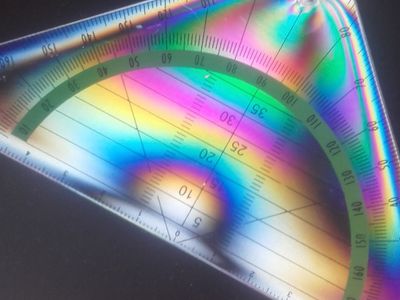Electromagnetic fields, propagation in vacuum and matter. Polarization, interference, thin film optics, optical metrology. Diffraction, Fourier optics, coherence, labs.
SK2300 Optical Physics 6.0 credits

In the course Optical Physics you study optical phenomena, as well as technological applications of optics. Topics are the nature of light, propagation of light, geometrical optics, optical instruments, polarisation, interference, diffraction, Fourier optics, quantum optics, holography, photodetectors and solar energy. Course activities are lectures, exercise classes and five labs.
The picture shows a plastic geo triangle under stress, which is placed between two crossed polarisers. The elasto-optic effect in the triangle produces a change in the light's polarisation and leads to the observation of various colours.
Teachers of this course: Marijn Versteegh, Val Zwiller and Stephan Steinhauer.
Content and learning outcomes
Course contents
Intended learning outcomes
After completing the course the student should be able to:
- Explain optical phenomena and solve technical problems related to optical technology applications
- Build and use optical setups to analyze optical phenomena
Literature and preparations
Specific prerequisites
For external students the following are required: 120 credits within natural sciences and engineering or corresponding knowledge and documented proficiency in English B or corresponding knowledge.
Recommedned previous knowledge:
Basic knowledge within classical physics, particularly waves and elementary classical optics (course SK1101, Classical Physics or corresponding), mathematics (vector analysis, differential equations, fourier transformation).
Recommended prerequisites
Basic knowledge within classical physics, particularly waves and elementary classical optics (course SK1101, Classical Physics or corresponding), mathematics (vector analysis, differential equations, fourier transformation).
Equipment
Literature
Examination and completion
If the course is discontinued, students may request to be examined during the following two academic years.
Grading scale
Examination
- LAB1 - Laboratory Work, 2.0 credits, grading scale: P, F
- TEN1 - Examination, 4.0 credits, grading scale: A, B, C, D, E, FX, F
Based on recommendation from KTH’s coordinator for disabilities, the examiner will decide how to adapt an examination for students with documented disability.
The examiner may apply another examination format when re-examining individual students.
Other requirements for final grade
One written exam (TEN1; 4 university credits). Laboratory work (LAB1; 2 university credits).
Opportunity to complete the requirements via supplementary examination
Opportunity to raise an approved grade via renewed examination
Yes
Examiner
Ethical approach
- All members of a group are responsible for the group's work.
- In any assessment, every student shall honestly disclose any help received and sources used.
- In an oral assessment, every student shall be able to present and answer questions about the entire assignment and solution.
Further information
Course room in Canvas
Offered by
Main field of study
Education cycle
Add-on studies
SK2400 Quantum Electronics, SK2401 Electro Optics and SK2350 Optical Measurement Techniques.